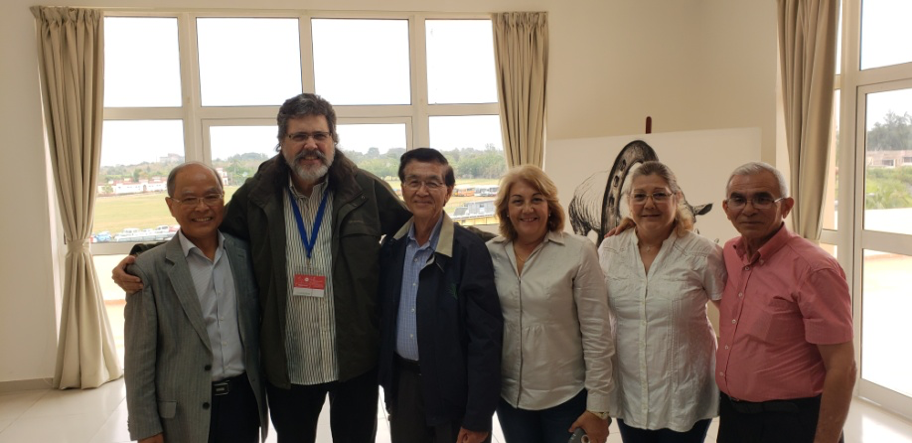The worldwide organization of Soka Gakkai is classed as a “new religious movement,” which is characterized by lay leaders and pastors, a vibrant and proactive missionary philosophy, and a core message that is easily replicable and attractive. In Soka Gakkai’s hermeneutic, the Lotus Sutra is the core scripture that contains the essence of the Buddha’s message. The central practice is the consistent and devotional chanting of “Namo-myoho-renge-kyo.”
The institution of Soka Gakkai, Soka Gakkai International (SGI) sees its goal as to, “revolutionize the inner worlds of all individuals, preliminary to the establishment of a more peaceful world. With their eyes on this achievement, SGI works to foster a culture of peace throughout the world, advocating human rights, sustainable development, humanitarian aid and interreligious dialogue.”
SGI has been thriving in Cuba since 1996. Its origins were humble, starting off with only seven households. Currently, its membership count is over a thousand, which is considerable for the small island’s even smaller Buddhist population. The Cuba chapter is currently led by Joannet Delgado, who Dr. Douglas Calvo Gainza interview in his article, “El budismo enaltece a la mujer: Entrevista a Joannet Delgado, presidenta de la Soka Gakkai en Cuba.”
Currently based in Havana, Joannet is aware of the gender factor in her leadership. She tells BDE: “Due to the nature of women, the givers of life. Thanks to women the world continues to procreate, and procreation is only done by women. Until they invent something else. This means that inside women, deep within and instinctually, there is a maternal feeling. One of understanding, of tolerance, of wanting things to turn out well, of always seeking the best way to ensure that everything flows. And, from this viewpoint, this does contribute to the socialization of people and bringing them together, even when they think very differently.”
There are many more women than men in SGI, with a general two-to-one ratio. Joannet observes that there are particular features in different provinces. “Which makes sense, given the characteristics of our society and the emancipation of women in each territory. For example, if we go to the eastern provisions—Holguín and Santiago de Cuba—there would generally be more men than women. Although one may assume that people’s mentality has changed, as all of us evolve, traces of machismo do continue to exist, and ideas that women should only occupy themselves with other matters. So, it makes sense that the male gender is predominant, although not so much so as to be double.” This is different in Havana, where female members are more numerous.
Machismo remains a persistent gender problem in the Spanish-speaking world, which at its most general is a strong sense of masculine pride. Research has shown that men react far more explosively when challenged about their masculinity than when women are challenged about their femininity. According to a 2021 study published in the Journal of Experimental Social Psychology, “The affective consequences of threats to masculinity,” it was concluded that “masculinity is important to men in a different way than femininity is important to women. Men are more likely to experience strong negative emotions in response to gender threats.” (PsyPost)
This is why Joannet sees Buddhist non-attachment to gender norms and its philosophical challenge to dualistic thinking so important: “Buddhism was the first religion that created a community of female monks, and ensured women that both females and males had equal conditions and possibilities to attain Buddhahood,” she says. “And although Shakyamuni established eight mandatory rules for female monks, and made them very dependent on men, it was a great recognition of women. Especially when recalling that we are speaking of the fourth to fifth century BCE. So, beyond its limitations, Buddhist teachings were the first to give women the opportunity to become empowered and to find equal spiritual conditions with regard to man.”
As a religion operating within the world, Buddhism is not free from issues of patriarchy. Many of these issues can even be said to be systemic. However, the example of Joannet and Cuba’s female practitioners of SGI indicate that there is something at the core of Buddhism that fundamentally questions and deconditions the cultural accretions and baggage that have troubled gender relations for millennia. There is much work to do, but the recognition of Buddhism’s potential is there. In deconstructing machismo from a Dharma perspective, Havana is only the beginning for the Latin American world.
See more
Men are more likely than women to experience strong negative emotions in response to gender threats (PsyPost)
The affective consequences of threats to masculinity (Journal of Experimental Social Psychology)


